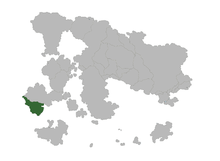Scuro
| This page is a work in progress by its author(s) and should not be considered final. |
| The Capitalist Democracy of Scuro | ||||
|---|---|---|---|---|
|
||||
| Motto: For the Free Market! | ||||
| Anthem: Wealth Never Rests | ||||
The location of Scuro (green) within Moneylania (pale green).
|
||||
| Capital | Scurose | |||
| Official languages | Platacian, English | |||
| Recognised regional languages | Morkeian | |||
| Ethnic groups (2025) | Scuroian, Solisarian, Ironian | |||
| Demonym | Scuroian | |||
| Government | Federal Presidential Constitutional Republic | |||
| - | President | Raul Trentino | ||
| - | Vice-President | Pieter Baart | ||
| Legislature | Board of Directors | |||
| - | Upper house | Upper Board | ||
| - | Lower house | Lower Board | ||
| Indpependent | ||||
| - | Independence | 1427 | ||
| Area | ||||
| - | 458,773 km2 177,133 sq mi |
|||
| Population | ||||
| - | 2026 estimate | 28,398,456 | ||
| GDP (nominal) | estimate | |||
| - | Total | 972,931,102,560 | ||
| - | Per capita | 34,260 | ||
| Currency | Scuroian Dollar (SCD) |
|||
| Time zone | CMST | |||
| Date format | dd-mm-yyyy | |||
| Drives on the | right | |||
| Calling code | +72 | |||
| Internet TLD | .scr | |||
Contents
History
Early History
The earliest known inhabitants of the Scuroian region were nomadic hunter-gatherers, that entered the area as early as 6000 BC. Between the Second and Third Centuries AD, peoples descended from the Lothinese ethnic group drove out or subjugated these tribes, and sparsely colonised the land. Following the spread of Islam in the eighth century, these civilisations became more permanent, and started attempting to expand into modern-day Isolato.
Conquest and Colonisation
In the early Fourteenth Century, Platacian ambitions of Proto-Imperialism came to light. The Platacian Emperor wished to begin an overseas colony, and found a perfect opportunity to do so in Lothinese Scuro. In 1322, a Holy War was declared against the Muslim and Pagan populations inhabiting Scuro. By 1324, Platacia had occupied the entire region, and begun driving out the Lothinese population as well as subjugating the Pagans.
Independence
In the winter of 1427, Platacian Emperor Thorsten II was found dead, having died peacefully overnight. This posed an issue as to what would become of the then Viceroyalty of Scuro, as due to the gavelkind succession laws in the empire at the time, Scuro would pass to his younger son, Prince Harald, while the rest of the empire would pass to his eldest son, the now Emperor Espodito IV. Despite Thorsten willing otherwise, Espodito claimed that Harald should remain a vassal of the Empire, rather than become an independent king.
Harald, who was already ruling in the Barony of Scurose, refused to accept these demands, and a brief succession war occured, that was interrupted when the Grey Horde launched an invasion of Kysten, which was under Espodito's rule. The Emperor decided it was not worth fighting a two front war, and accepted Scuro's independence less than a year after the war started.


